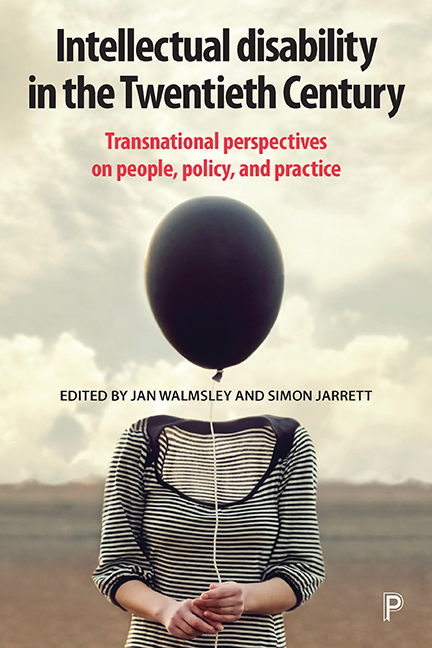 Intellectual Disability in the Twentieth Century
Intellectual Disability in the Twentieth Century Book contents
- Frontmatter
- Contents
- Notes on editors and contributors
- Introduction
- one Paradoxical lives: intellectual disability policy and practice in twentieth-century Australia
- two Tracing the historical and ideological roots of services for people with intellectual disabilities in Austria
- three Time of paradoxes: what the twentieth century was like for people with intellectual disabilities living in Czechoslovakia/Czech Republic
- four Intellectual disability in twentieth-century Ghana
- five A Greek Neverland: the history of the Leros asylums’ inmates with intellectual disability (1958–95)
- six Intellectual disability in Hong Kong: then and now
- seven People with intellectual disabilities in the European semi-periphery: the case of Hungary
- eight People with intellectual disabilities in Iceland in the twentieth century: sterilisation, social role valorisation and ‘normal life’
- nine Institutionalisation in twentieth-century New Zealand
- ten ‘My life in the institution’ and ‘My life in the community’: policies and practice in Taiwan
- eleven Intellectual disability policy and practice in twentieth-century United Kingdom
- twelve From social menace to unfulfilled promise: the evolution of policy and practice towards people with intellectual disabilities in the United States
- Index
Introduction
Published online by Cambridge University Press: 27 April 2022
- Frontmatter
- Contents
- Notes on editors and contributors
- Introduction
- one Paradoxical lives: intellectual disability policy and practice in twentieth-century Australia
- two Tracing the historical and ideological roots of services for people with intellectual disabilities in Austria
- three Time of paradoxes: what the twentieth century was like for people with intellectual disabilities living in Czechoslovakia/Czech Republic
- four Intellectual disability in twentieth-century Ghana
- five A Greek Neverland: the history of the Leros asylums’ inmates with intellectual disability (1958–95)
- six Intellectual disability in Hong Kong: then and now
- seven People with intellectual disabilities in the European semi-periphery: the case of Hungary
- eight People with intellectual disabilities in Iceland in the twentieth century: sterilisation, social role valorisation and ‘normal life’
- nine Institutionalisation in twentieth-century New Zealand
- ten ‘My life in the institution’ and ‘My life in the community’: policies and practice in Taiwan
- eleven Intellectual disability policy and practice in twentieth-century United Kingdom
- twelve From social menace to unfulfilled promise: the evolution of policy and practice towards people with intellectual disabilities in the United States
- Index
Summary
Why this book, why now?
Thank you for coming to read this book. We believe it is the first of its kind to take a historical view of policy and practice in intellectual disability across continents, and we are certain it is unique in its emphasis on the impact on individuals. We are extremely proud of it and excited about its potential; however, it is not the book we intended to write.
The book started in early 2017 when Jan, one of the editors, approached Policy Press to enquire whether they would publish a book on the twentieth-century history of intellectual disability in England. The response was cautious – will it have an international element? I had been here before. The book I co-edited with John Welshman on the history of community care for people with intellectual disabilities (Welshman and Walmsley, 2006) had four international chapters, but the bulk was about the UK. This time, I (Jan) decided to go the whole hog, to attempt a transnational history, without in any way privileging the UK. I invited Simon to join me, and he accepted. And so the book began.
The book has chapters about 12 countries: six in Europe, one in North America, one in Africa, two in Asia and two in Australasia. We were deliberately not prescriptive when we invited authors to contribute. There are many reasonable ways to construct a century of a nation's history and we left it to chapter authors to choose their path rather than trying to impose uniformity. It means the chapters are all quite different. What they have in common is that each provides for their country an overview of any major changes in policy during the twentieth century; and examines how practice on the ground impacted on the lives and experiences of people with intellectual disabilities, their families and others associated with them. And to bring this aspect to life, we asked authors to use one or more life stories. People interpreted this differently. Some authors chose to use a case study to provide the central narrative – see for example Danae Karydaki's chapter on Greece, with its focus on the notorious Island of Leros, and Guðrún Stefánsdóttir's on Iceland, built around the life story of her friend Ebba. Others have used life stories as short vignettes, illustrating different aspects of policy.
- Type
- Chapter
- Information
- Intellectual Disability in the Twentieth CenturyTransnational Perspectives on People, Policy, and Practice, pp. 1 - 20Publisher: Bristol University PressPrint publication year: 2019


